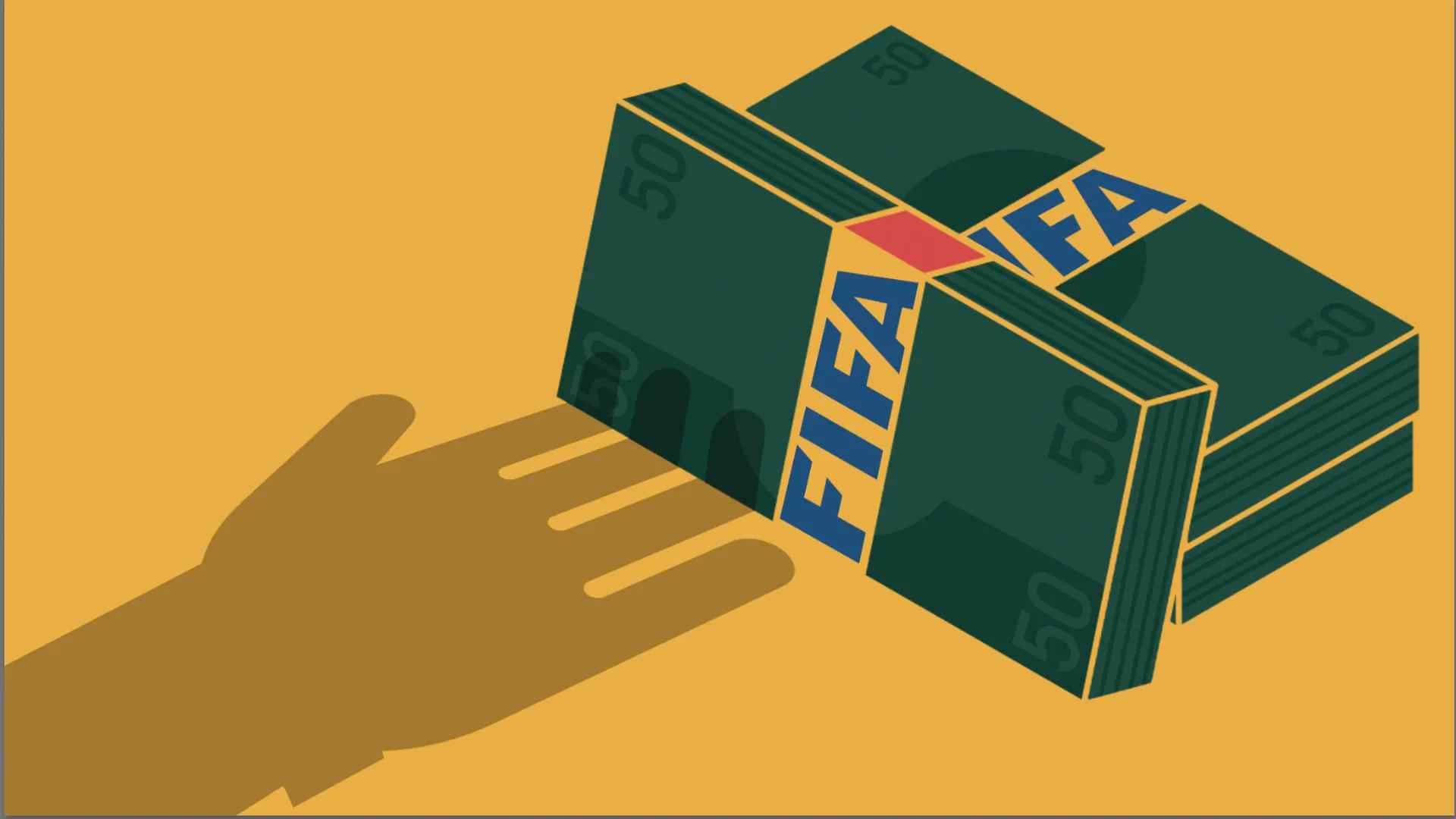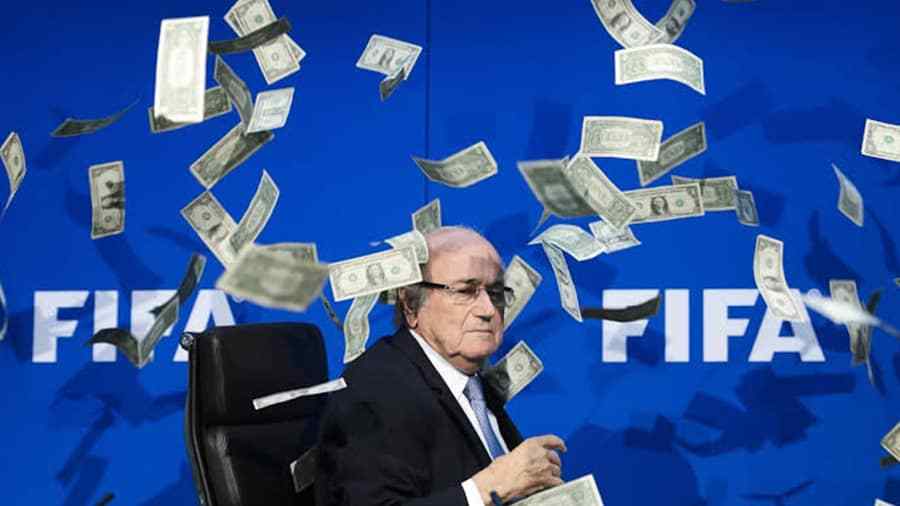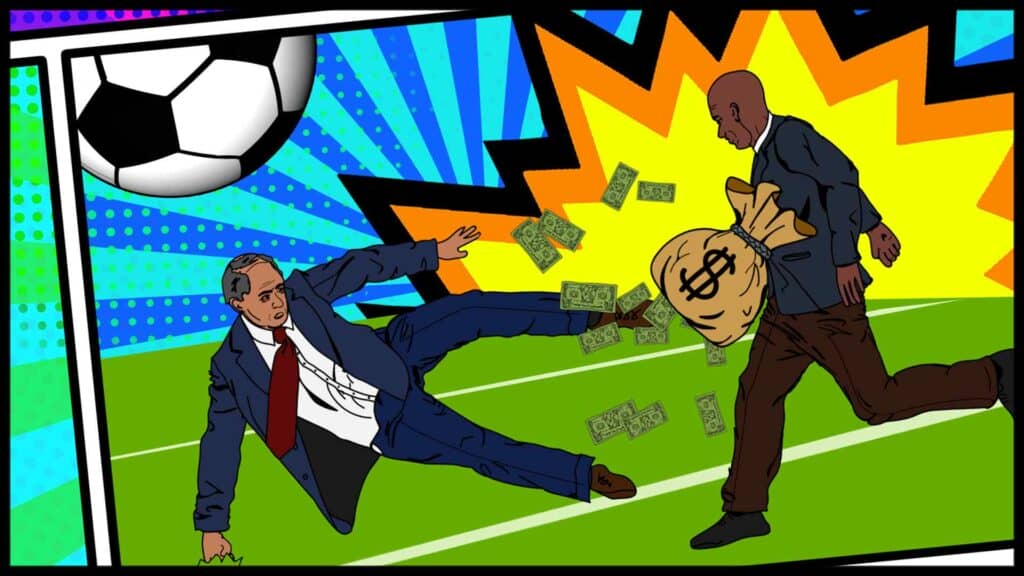
Are you aware that a staggering sum of over $136 billion is bet on soccer annually?
We’re about to tackle the contentious topic of FIFA World Cup game manipulation.
We’ll discuss the magnitude of betting, the measures FIFA has implemented to prevent game manipulation, and the involvement of independent organizations.
You’ll gain insights about previous cases, the intricacy of current match manipulation, its economic impact, and the legal repercussions.
Brace yourself for an informative journey into the less talked about aspects of the world’s most watched sport.
The Scale of Betting in FIFA World Cup

Betting in the FIFA World Cup involves an enormous amount of money. It’s not only about predicting the ultimate champion.
One could wager on the player scoring the initial goal, the team attracting the highest number of yellow cards, or even provide accurate forecasts for specific games.
The understanding of how betting odds operate is vital. Their changes are influenced by aspects such as team form, player injuries, and past performance in competitions.
Bookmakers employ sophisticated algorithms and professional analysis to modify these odds immediately as the games unfold.
Considering this magnitude, it is understandable why some individuals question the possibility of match-fixing in such a high-risk environment. It’s a contentious subject that stirs emotions among football fans across the globe.
FIFA’s Measures Against Match-Fixing
In a bid to fight match-fixing, strict measures have been implemented to maintain the purity of the sport. FIFA has constructed a potent system that you would find impressive, designed to identify and hinder any deceptive operations.
Specialists have been mobilized to monitor betting trends for indications of odd activities. Any inconsistencies are immediately flagged.
A conduct agreement is mandatory for all World Cup referees and players to sign. This agreement delineates their commitment to fair play and specifically bars them from involvement in any betting-related activities.
It’s worth mentioning that FIFA has made significant investments in educating stakeholders about the perils and repercussions of match-fixing.
Bear in mind, these measures aren’t just reactive; they’re proactive steps with the aim to keep soccer free from corruption and reliable for fans like yourself across the globe.
The Role of Third-Party Organizations

It’s intriguing to know that third-party organizations have a crucial role in fighting match-fixing. They tirelessly work behind the scenes to maintain fairness and integrity in soccer matches, including those in the FIFA World Cup.
These organizations utilize a range of strategies:
- Data Analysis: They carefully examine betting patterns for any sign of irregular activity, which might imply match manipulation.
- Education Programs: They hold workshops and seminars to enlighten players, referees, and coaches about the consequences of match-fixing.
- Whistleblowing Mechanisms: Anonymous reporting lines are set up to motivate insiders to inform about any dubious activities.
- Collaboration with Legal Authorities: They work closely with law enforcement agencies across the globe for legal action against wrongdoers.
Bear in mind, preserving the integrity of football from corruption is a responsibility that falls on everyone’s shoulders!
Past Incidents of Match-Fixing in Soccer
As you dive into more obscure aspects of soccer, you might encounter numerous precedents where games were distorted for personal or monetary benefits. This harsh truth exists in ‘the beautiful game,’ where unseen forces occasionally manipulate situations from behind the scenes.
Consider the scandal in the Italian Serie A in 2006. Elite squads like Juventus were involved in swaying game results through referee appointments – a quintessential case of match-fixing that rattled soccer’s foundation.
Or think about South Africa’s friendly matches before the 2010 World Cup – questionable refereeing decisions attracted attention and later investigations exposed unfair practices.
Recognizing these examples allows you to comprehend the depth of corruption within soccer, casting a pall over even its most renowned events.
The Complexity of Modern Match-Fixing

The complexity of contemporary match-fixing is not limited to influencing referees. It has metamorphosed into a complicated network of unlawful activities that stain the purity of soccer. It’s necessary to comprehend the magnitude of these actions more effectively.
- Player Bribery: Players might be financially tempted to perform poorly or deliberately err, which can dramatically shift the game’s result.
- Illegal Betting Syndicates: These organizations take advantage of inside knowledge and control odds for colossal financial profit.
- Club Corruption: Occasionally, even the team’s management is implicated in directing games, frequently due to economic hardship.
- Referee Manipulation: This age-old technique continues to be prevalent, with officials being swayed to bias their rulings towards one team.
These factors blend like a meticulously planned concert of dishonesty that tarnishes the game that is adored by many. This leaves both spectators and athletes feeling dispirited and cynical.
The Financial Impact of Match-Fixing
The financial implications of match-fixing on soccer are colossal, and it’s something that can’t be sidelined. It’s not only about the gigantic amounts of money that go to illicit betting syndicates; this disgraceful act also devalues the commercial worth of the sport.
Sponsors are hesitant to align their brand with a manipulated game. Consider a broadcaster who has invested millions for exclusive rights only to discover that the matches are pre-arranged.
Ticket sales take a hit when spectators doubt the fairness of the game. The credibility of soccer holds infinite value, and once stained, reclaiming trust is a challenge.
Legal Consequences of Match-Fixing
The legal penalties for match-fixing are stringent, posing a risk of imprisonment for those involved. Consider these four major consequences:
- Criminal Charges: Engaging in match-fixing is a violation of the law and can result in serious charges like fraud and corruption.
- Lifetime Bans: FIFA retains the right to impose a lifetime ban on any player, coach, or official proven guilty of match-fixing.
- Fines: Convictions for match-fixing often carry substantial fines, apart from the possibility of jail time.
- Reputation Damage: Apart from legal penalties, association with match-fixing scandals can irreparably damage a player’s reputation.
It is important for anyone involved in soccer at any capacity to understand these ramifications. It’s not merely about ‘fair play’; it’s about safeguarding your career and freedom too.
Conclusion
At the grand spectacle of the FIFA World Cup, you’re left to question – is the game rigged?
As Hamlet’s Shakespeare would declare, ‘There’s something corrupt in the country of Denmark.’
But don’t be alarmed, FIFA’s not neglecting their duties. They’re addressing match-fixing directly with independent organizations.
Still, bear in mind that soccer’s intricate network can often disguise these violations.
So, keep your sight sharp and your ardor ignited, for the adoration of this stunning sport!



